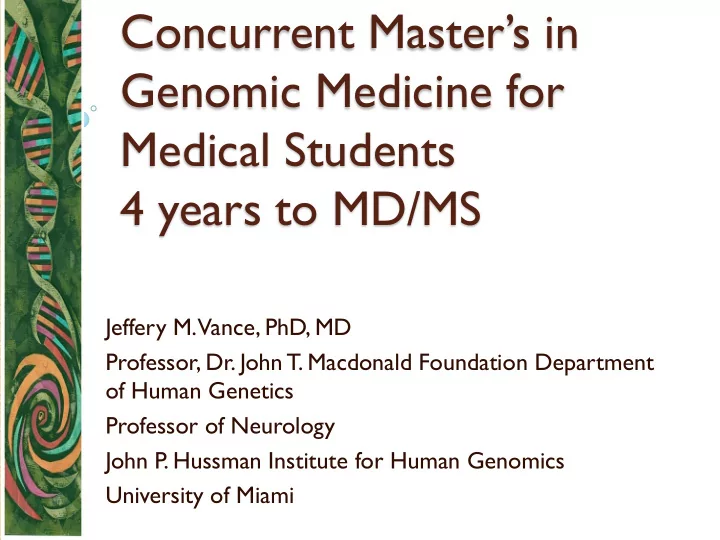

Concurrent Master’s in Genomic Medicine for Medical Students 4 years to MD/MS Jeffery M. Vance, PhD, MD Professor, Dr. John T. Macdonald Foundation Department of Human Genetics Professor of Neurology John P . Hussman Institute for Human Genomics University of Miami
Program Background The potential for genomic information to be incorporated into medicine is increasing rapidly Experience: Guilford County GM in NC in private practices about 12 years ago (now known as the Genomedical Connection) DOD funded, purpose was modeling more than practice Problem: Not the public but the physician ◦ Physicians are reluctant to practice genomics ◦ Physicians are the actual consumers, the gatekeepers to the patients ◦ Without creating and educated “market” we could end up the GM food problem
Training Physician “Consumers” One of the major bottlenecks is the lack of knowledge and “comfort” by physicians: ◦ Knowledge: Older physicians never were taught genetics Medical school curriculum's are already full ◦ Lack of training increases Concern of litigation Time needed to “catch-up”, further dissuading MDs
Program Background Masters ◦ Avoids curriculum problem ◦ Train one, they train others ◦ Increases awareness in other medical students ◦ Goal is create a qualified consumer and advocate ◦ Increases value for residency? Medical School Approaches ◦ Add a year for Masters Incorporate training over regular 4 years Gives time for questions and hopefully reinforces training Keeps up-to-date into residency Less intense infrastructure
Program details 30 credit hour program over 4 years ◦ Didactic coursework (self-paced online modules) ◦ Small group discussions ◦ Laboratory rotations ◦ One clinical rotation ◦ Research thesis in genomics Concurrent with medical curriculum ◦ Last two years of MSGM focus on research and clinical experience
Hussman Institute and Department of Genetics Support faculty Statistical/Bioinformatics 8 faculty Epigenetics 2 faculty Molecular 8 faculty Clinical 6 faculty Ethics 2 faculty Clinical Laboratory 3 faculty Genetic Counselors 5, one faculty Currently 17 graduate students for PhD
MSGM Curriculum Year 1(second Year 2 Years 3 & 4 semester) Fundamentals of Genomic Computational Methods for Genomic Medicine Clerkship: An Medicine : Intro to basic concepts, Genomic Medicine : Will provide elective clerkship in genomic medicine terminology, and clinical skills instruction on basic biostatistical or medical genetics completed as part important in genomic medicine. terminologies and tests as well as risk of the MD curriculum. assessment and bioinformatics tools. Clinical Applications of Genomic Clinical Applications of Genomic Genomic Medicine Practicum: Medicine I : Provides genomic Medicine II & III : Topics covered Students will complete a clinical or medicine case studies and systems- include respiratory system, research practicum focusing on an based learning paralleling the medical nephrology, gastroenterology and aspect of genomic medicine, which school core curriculum. nutrition. culminates in a written master’s paper and public presentation. Genome Ethics and Public Policy: Research Ethics: Prior to research Small Group Sessions A case-based approach to discussing practicum, training in the responsible Regular small group sessions for ethical, legal and social issues related conduct of research, protection of literature and cases students have to genomic medicine. human subjects, and obtaining experienced regulatory approval. Genomic Medicine Laboratory: Pharmacogenetic s: Overview of Rotation in the molecular genetics known drug/gene interactions, and biochemical genetics diagnostic interpreting test results, and laboratories. integrating these results into clinical practice.
Program structure and timeline First class accepted for Spring Semester 2013 ◦ 10 students applied in November from 150 in first year ◦ 9 were approved, one not doing well enough in MD classes ◦ 5 students in 1 st class, 4 decided not to move ahead, 3 to $$ ◦ Interests? Neurosurgery, Oncology, Pediatrics, Cardiology, and Internal Medicine
Student Perspective/motivations Realization that genetics is in all aspects of medicine Benefit of being “first in the field” of medical students with degree in genomic medicine Personal interest in genomics/genetics Have already noted usefulness in understanding some MD lectures http://medgen.med.miami.edu/educatio Often report errors in MD lectures n/msgm T wo students sought and received funding for diversity conference on genomics this week
Program Background Problems ◦ Added cost of about 8K per year for in-state ◦ Not all students can handle both programs ◦ Have to remain flexible in scheduling ◦ Added time for students Future ◦ Funding Hayward Foundation funded initial costs At 35 students total should be self-supporting Needs: support for program and students ◦ Advertise for incoming class
Acknowledgements Contributors ◦ Bill Scott PhD ◦ Kayla Czape, GCS ◦ Susan Blanton PhD ◦ Margaret Pericak-Vance PhD http://medgen.med.miami.edu/education/ msgm
Recommend
More recommend